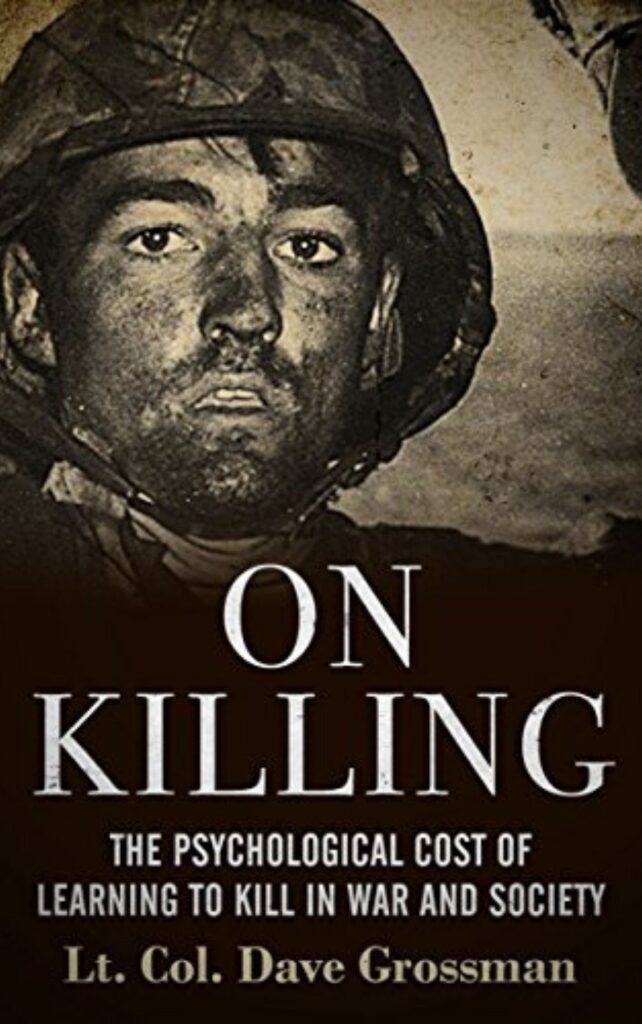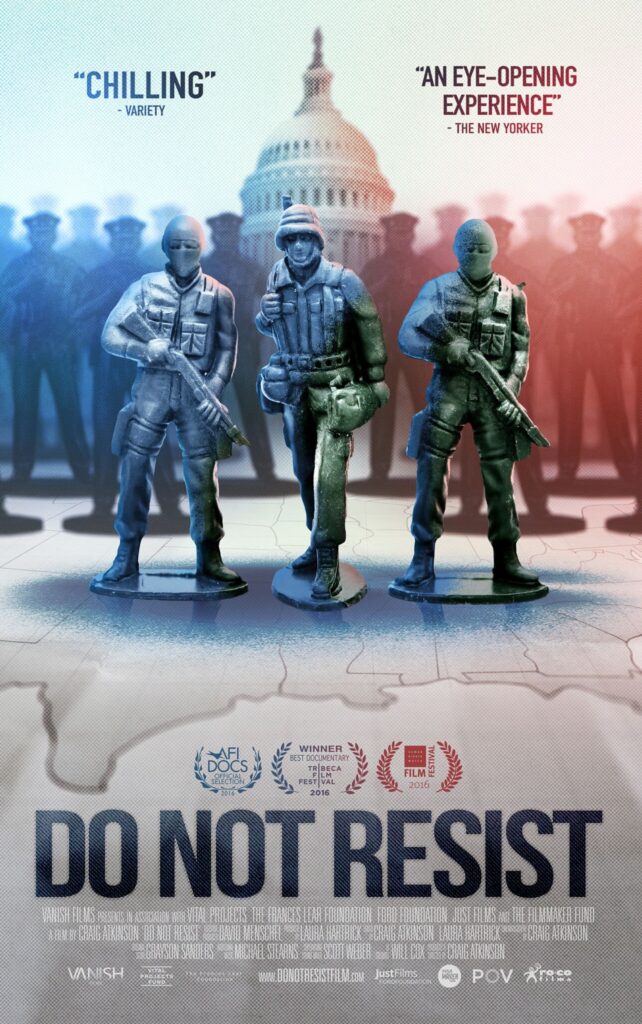A few weeks ago I was packing up my home office to make way for my nine-year-old daughter, whose desire for her own bedroom superseded my need for space in order to write blog posts like this one.
At one point I had left behind a bookcase, one shelf of which held books I used as research for my novel, We Take Care of Our Own (coming later this year on Montag Press). After a couple of nights, my daughter requested that I move this bookcase somewhere else, since a mere skim along the spines of these books, including The Psychopath Test, War on the Mind, and Where To Invade Next gave her a slight scare. Of course, no other title feels as loaded with disturbing insight as On Killing: The Psychological Cost of Learning to Kill in War and Society by Lt. Col. Dave Grossman.

I had purchased On Killing to see if maybe I could gain some insight into the act of state-sanctioned killing so that I could write a couple of my characters with the slight authority that comes from having read a couple of good books on a subject. (I can remember it turning up after I had typed the words “soldier” and “killing” into my Amazon search bar.)
On Killing is a hefty one — my paperback edition comes in at nearly 350 pages — and yet it’s extremely readable, with mind-blowing insights every few pages. It’s also heroically researched and powerfully written, as every statement seems to be backed up by historical examples and counterexamples rendered in good faith. The author’s expertise is most apparent when delving into the science involved in convincing one human being to kill another human being, a science that tends to involve dehumanization of the targeted human being, psychological remove, groupthink, and aggressive conditioning.
One of the more notable assertions made repeatedly in the book is that people are generally naturally averse to committing and receiving acts of violence, and this aversion displays itself in the psychological disorders of anxiety, depression, and PTSD which tend to appear in people who have been victims or perpetrators of violent acts. Killing comes naturally to no one. People must first be convinced, then conditioned to kill.
The book concludes with an argument for the near-complete overhaul of society’s approach toward violence, a little of which I’d like to share with you here:
Throughout history nations, corporations, and individuals have used noble-sounding concepts such as states’ rights, lebensraum, free-market economics, and Constitutional rights to mask their actions, but ultimately what they are doing is for their own personal gain and the result—intentional or not—is killing innocent men, women, and children. They participate in a diffusion of responsibility by referring to themselves as “the tobacco industry” or “the entertainment industry,” and we permit it, but they are ultimately individuals making individual moral decisions to participate in the destruction of their fellow citizens.
The ever-ascending tide of violence in our society must be stopped. Each act of violence breeds ever-greater levels of violence. The study of killing in combat teaches us that soldiers who have had friends in combat are much more likely to kill and commit war crimes. Each individual who is injured or killed by criminal violence becomes a focal point for further violence on the part of their friends and family. Every destructive act gnaws away at the restraint of other men. Each act of violence eats away at the fabric of our society like a cancer, spreading and reproducing itself in ever-expanding cycles of horror and destruction. The genie of violence cannot really ever be stuffed back into the bottle. It can only be cut off here and now, and then the slow process of healing and resensitization can begin.
Amen, brother. I had purchased On Killing because I wanted to enter the minds of a couple of fictional characters but what I got was a deep insight into a theme I had been only vaguely toying with up to that point. The influence of On Killing can be seen all over We Take Care of Our Own, from the concept of “diffusion of responsibility,” which I believe to be the hallmark of corporate capitalism in the 21st century, to the “ever-expanding cycles of horror and destruction” that define the world of my novel.

It was a little upsetting, then, when I saw Grossman turn up in Do Not Resist, a 2016 documentary directed by Craig Atkinson about the “Ferguson Unrest” in the wake of Officer Darren Wilson’s murder of Michael Brown and the unfettered militarization of local police departments across the U.S. over the last couple of decades. (I recommend it to anyone wishing to learn more about the origins of the current Black Lives Matter protests and their attendant police-incited violence, or really anyone who wants to know what is happening in this country right now.) Grossman comes off as a wild-eyed ghoul in the doc, standing before a hundred-plus police officers and S.W.A.T. team members in a dreary hotel auditorium in Ohio and telling them not to worry about being sued for the inappropriate use of deadly force, and that they will likely be so amped after a violent encounter that they’ll go home and enjoy the best sex in months. (Some of that footage can be found for free here.) It’s as if he is saying that the cost of learning to kill in war and society is: there is no cost.
I don’t think it requires much of a leap to see how we’ve gone from Grossman’s macho jackass rhetoric as a police trainer to “I Can’t Breathe.” The militarization of our police involves more than just a few departments receiving troop carriers and machine guns left lying around from the War on Terror; it’s the conditioning of our cops in the same exact way we condition soldiers assigned to hostile foreign territories, with poor minorities standing in for enemy soldiers. In some cases, the white supremacist rhetoric isn’t even subtextual. No wonder routine traffic stops instigated by malfunctioning tail lights and unused seat belts escalate to murder so incredibly quickly—thanks to Grossman’s expertise, we are training police officers to “participate in the destruction of their fellow citizens.”
Yeah, OK, film can be edited and spliced to fit a filmmaker’s agenda (and if Atkinson’s agenda included making Grossman look like a wild-eyed ghoul, well, mission accomplished), but these and sundry other statements Grossman proudly makes in the doc and elsewhere have me wondering if something happened in the seven years between On Killing and Do Not Resist to cause him to devolve from recommending immediate cultural revolution to transform society’s attitudes toward violence to preaching on violence as a gateway to personal ecstasy. I cannot begin to understand how a man capable of crafting the two paragraphs I excerpted above lives in the same skin as the guy who makes a mint telling cops-in-training that their job is no different from that of the Marine invading Baghdad.
My novel, We Take Care of Our Own, is about the dehumanization of people living in a militarized culture. A great deal of inspiration for that novel comes from a book written by a man partially yet unmistakably responsible for militarizing the culture in which we live.